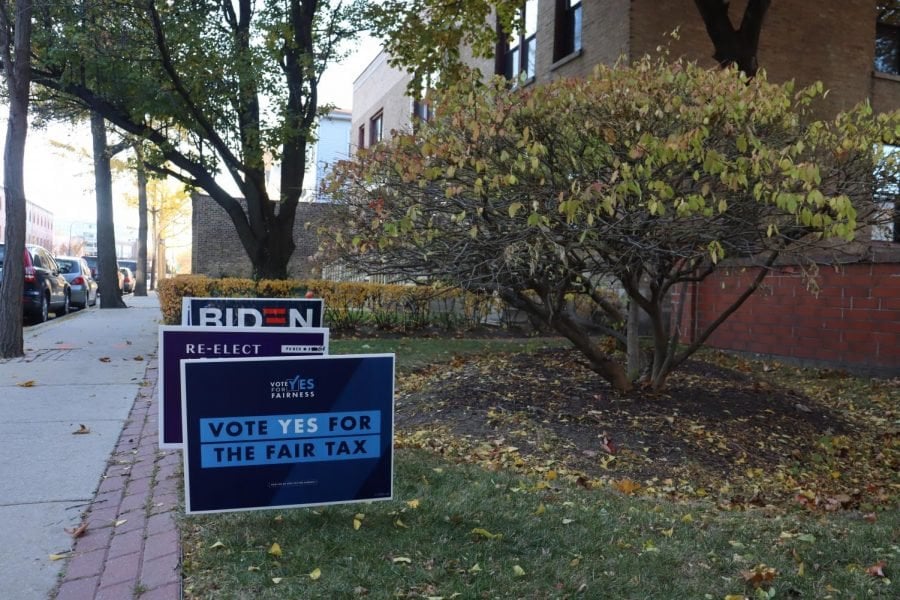Advocates against income inequality reassess after the Fair Tax Act’s failure
James Pollard/The Daily Northwestern
A sign in support of the Fair Tax Amendment outside of an Evanston polling place. Since Illinois voters rejected the Fair Tax Amendment in November, advocates across the state are assessing the path forward.
January 20, 2021
Since the Fair Tax Amendment was rejected last November, advocates are focusing their efforts toward building greater trust around the initiative and ensuring people across the state understand its purpose.
The Fair Tax Amendment would have introduced a progressive income tax to Illinois. The state currently mandates a flat income tax of 4.95 percent.
Illinois ranks eighth in the country for tax inequality, according to the Institute on Taxation and Economic Policy. Throughout the state, the lowest-income 20 percent contribute over 14.4 percent of total state and local taxes, while the richest 1 percent contribute just under 8 percent.
The amendment’s advocates fought for a graduated income tax to address tax inequality, a contributing factor to growing income and wealth gaps. Now, they’re assessing its failure and considering paths forward. Ann Courter, an issue specialist with the League of Women Voters, said the ballot initiative failed partly because people didn’t trust the government to spend the increased revenue responsibly.
“We need to work… to make sure we’ve got a clear and accurate message,” Courter said.
Under the graduated tax plan laid out by the Fair Tax Amendment, only 3 percent of taxpayers — those who earn more than $250,000 per year — would have experienced tax hikes. Those with incomes lower than $100,000 would have seen tax cuts.
The tax increase on the wealthiest 3 percent of Illinoisans would have raised an additional $3.4 billion over twelve months, which would have allowed Illinois to address its deficit and ease up on sales and property taxes. According to a 2020 report from ITEP, the additional revenue would have reduced income inequality and helped narrow the racial wealth gap.
“(Income inequality) is a huge problem nationwide,” Courter said. “This kind of… gap in our country is just unconscionable.”
According to the left-leaning Center on Budget and Policy Priorities, the gap between the lowest- and highest-income households has grown nationwide since 1970, with Illinois consistently ranking among the ten most inequitable states.
The ITEP report also notes in a regressive tax system, where the poor shoulder larger tax burdens than the rich, this inequality widens.
“Because the wealthiest Illinoisans have lower tax responsibilities under the current flat tax… the wealthy can invest these ‘saved’ tax dollars to build even more wealth,” the report says. “Meanwhile, the same laws make it harder for low- and moderate-income families to get by… (resulting in) wealth gaps that compound over time and are starkest along racial and ethnic lines.”
These wealth inequalities often run along racial and ethnic lines. A 2020 report from the Federal Reserve found that, nationwide, the median White family owns $188,200 in wealth, whereas the median Black and Latinx family owns $24,100 and $36,100, respectively.
Evanston’s reparations fund has sought to narrow the racial wealth gap, but advocates said taxes are another important arena for addressing injustice.
“Taxes (are) huge when it comes to changing… systemic racism,” said Kemone Hendricks, founder of Evanston Present and Future, a non-profit that focuses on racial injustice and reparations. “If (the Fair Tax Act) were to pass, that would have tightened a lot of the (racial) wealth gap.”
But the amendment didn’t pass — in fact, it was defeated by a margin of almost 7 percent.
The amendment was broadly viewed with suspicion and opposed by billionaires like Ken Griffin, who donated $46,750,000 to the No Progressive Tax Coalition, a group that organized to block the initiative.
Shirley Adams, a 74-year-old Evanston resident, said among her friends and neighbors, a general distrust in government, caused by Illinois’s history of political corruption, fueled opposition to the amendment. She said this distrust made voters more vulnerable to misinformation.
“A lot of people thought they were voting to punish politicians for being inept, or… unscrupulous,” Adams said. “But instead of punishing politicians, I think they punished themselves.”
Some opponents also worried that the amendment could lead to increased taxes on small businesses or tax hikes across income brackets. However, Gov. J.B. Pritzker’s Office of Management and Budget estimated that 95 percent of Illinois small businesses would have been unaffected.
Sarah Bingaman, who works with Indivisible Rural Illinois, said she plans to focus on fighting misinformation and restoring trust. She hopes this will lay the groundwork for a different outcome if Democratic leadership proposes the amendment again.
“It’s all about trust,” Bingaman said. “If you can’t talk to people, you can’t change their minds about misinformation.”
Email: williamclark2024@u.northwestern.edu
Twitter: @willsclark01
RELATED STORIES:
— Illinois residents reject Fair Tax Amendment
— Equity and Empowerment Commission discusses racial disparity and reparations
— Sociologist discusses economic insecurities, income inequality at Connections for the Homeless event



